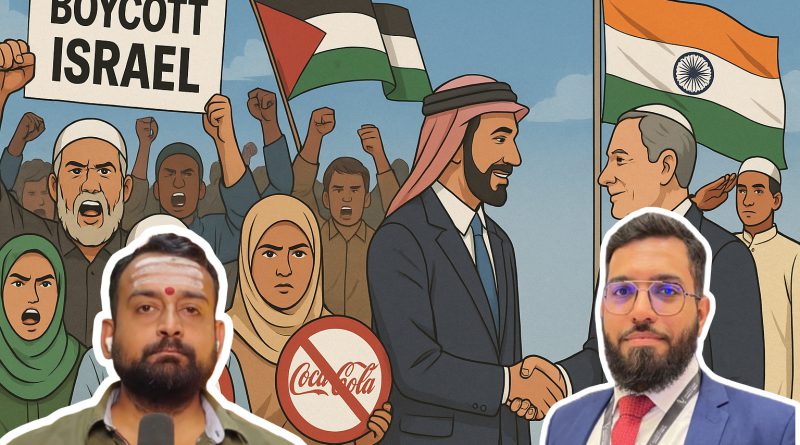Palestine Protests Vs. Other Muslim Issues—National Interest Comes First
New Delhi — In a candid and thought-provoking discussion, Vaibhav Singh, founder of the popular nationalist platform Defensive Offence, engaged with Zahack Tanvir, founder of Milli Chronicle Media UK, a counterterrorism expert and seasoned writer, to dissect the inconsistencies and contradictions in global and local Muslim activism—particularly how selective outrage has clouded the larger picture of geopolitical pragmatism and national interest.
Vaibhav Singh opened the conversation with a blunt observation: there seems to be a glaring absence of protests when it comes to atrocities faced by Uyghur Muslims in China, Balochs in Pakistan, or even the Sindhi and Pashtun communities who have endured brutal oppression. He questioned why the deaths of 20,000 Mahajirs in Karachi, Hyderabad, and Sukkur go unmentioned in Indian Muslim discourse, while emotional demonstrations erupt for Palestine and Rohingya Muslims.
He highlighted the horrific reality in Xinjiang, where practicing Islam is almost criminalized—people are forced to surrender prayer mats in police stations, growing a beard is banned, and even Islamic names are discouraged. Yet, no placards or rallies appear in Indian streets for them.
Instead, Singh lamented, the spotlight is always on Palestine. Thousands protest in Indian cities, sometimes to the extent of vandalism, as was the case when some reportedly attacked Amar Jawan Jyoti in Mumbai in the name of solidarity with the Rohingyas. “Why such selective empathy?” he asked. “Are Indian Muslims afraid of Pakistan and China?”
Zahack Tanvir responded with a layered analysis that combined historical context with geopolitical realism. He agreed that the overwhelming focus on Palestine while ignoring other equally devastating crises suggests a form of emotional manipulation rather than informed advocacy. “Most Muslims here don’t even realize that India is engaged in a silent conflict with both Pakistan and China,” he said. “But even beyond that, there is a kind of shameless tunnel vision—where people hold on to just one or two issues and act as if those define the entire Muslim world’s struggle.”
He dug deeper into the Palestinian issue, emphasizing how it has evolved over the last 75 years into a political industry. “Billions have been poured into it. NGOs, lobbies, donations, protests—yet no solution has emerged. Not because one isn’t possible, but because resolving it would shut down a global cottage industry of activism, influence, and income,” Zahack said. He clarified that his statements weren’t anti-Palestinian but rather critical of the politicization of their suffering.
He further illustrated how Palestinians, themselves a diverse mix of Muslims, Christians, Communists, Marxists, and Atheists, have historically disrupted the very nations that sheltered them. In Lebanon, internal conflict erupted with the local Christian population. In Jordan, they attempted to assassinate King Hussein. “This isn’t just a Muslim issue—it was initially an Arab issue supported by Arab Christians,” Zahack explained.
Shifting the lens inward, he shared a startling reality: many Palestinians, Syrians, and Jordanians are unaware that India has over 250 million Muslims. “When I told them, they were shocked. For them, Pakistan equals Muslims, and India equals Hindus,” Zahack said.
And yet, Indian Muslims in places like Mominpura, Shivaji Nagar, or Zakir Nagar wage symbolic battles—boycotting multinational brands like Nestlé, Starbucks, and McDonald’s—as a gesture of protest.
“But what difference does it make? In 1973, all Arab nations imposed an oil embargo on the U.S. It didn’t stop America from giving $2 billion in aid to Israel, and later $8 billion more,” Zahack pointed out. “When a country has wealth and a strong lobby, a few boycotted chocolates and potato chips won’t matter.”
Zahack stressed that national interest should always come first. “Every country is looking after itself. Sudan and Morocco don’t have a problem with Israel. Bahrain and the UAE have formal ties. The Turks and Kurds have moved on. So why are we getting emotionally entangled in their politics?”
Zahack reiterated India’s pragmatic foreign policy: a two-state solution that respects both Israeli and Palestinian rights to exist. “India isn’t blindly siding with anyone. It maintains healthy relations with Russia, the U.S., Israel, and the Arab nations. We are focused on trade, growth, and development,” he said.
He ended the discussion with a powerful anecdote: while speaking with an Egyptian army officer, Zahack explained why India doesn’t get involved in third-party fights. The officer nodded in agreement, appreciating India’s non-interventionist stance.
“Why should we fight your fight?” Zahack asked. “You fight today and hug tomorrow. We’ll mind our own business.”
The dialogue between Vaibhav Singh and Zahack Tanvir wasn’t just a critique of selective outrage; it was a call to maturity in activism. It challenged Indian Muslims—and Indians at large—to think with clarity, weigh their allegiances with wisdom, and prioritize national interest over borrowed causes.



